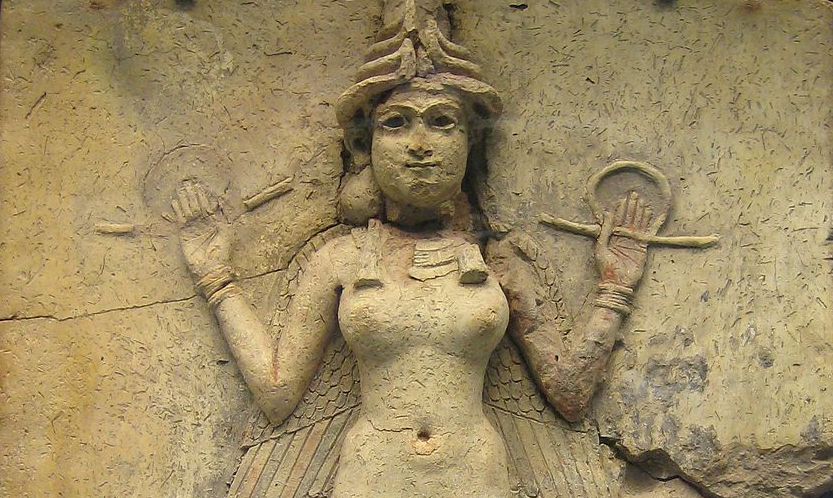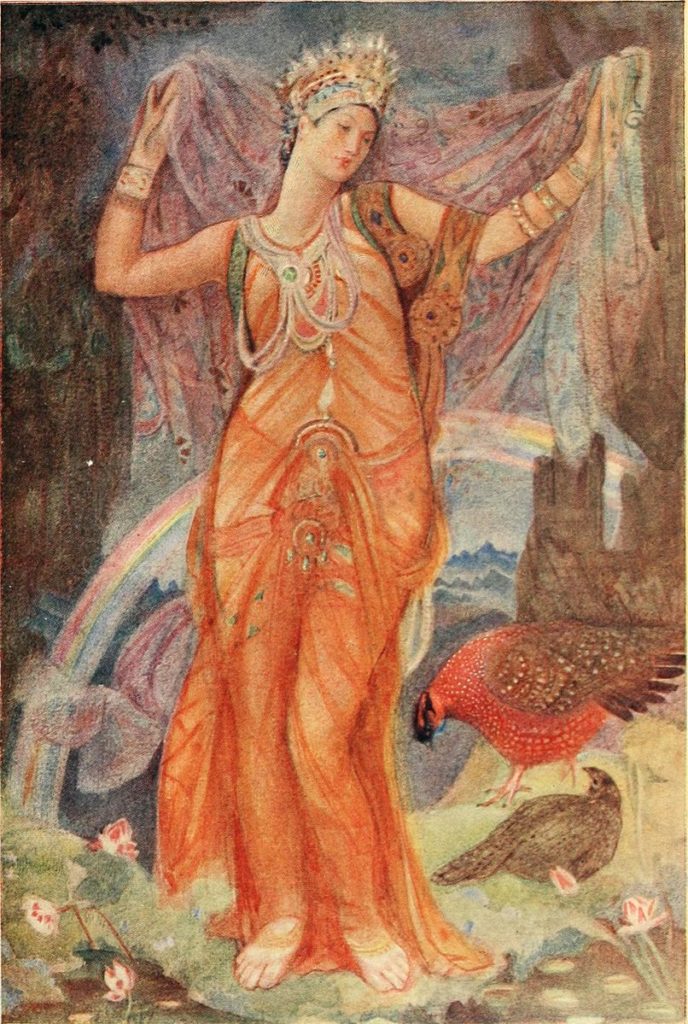
Your tears are sacred
Beloved Lady of Holy An
look at your tormenting emotions
All the time weeping—Enheduanna
I didn’t know it yet, but the first time I met Inanna, I was standing at the threshold of one of the darkest times of my life.
It was during the fall equinox, on the precarious cusp of the dark half of the year. I watched her courtship with Dumuzi played out in ritual. I followed her descent to the underworld. Saw her stripped of her regalia piece by piece. Witnessed her encounter with her dark sister Ereshkigal. Stared in disbelief as she fell lifeless at her shadow-self’s feet. Mourned over her corpse, a rotting slab of meat on a hook.
I didn’t understand yet what it all meant.

Later, by the bonfire, Inanna sat beside me and offered to let me try on her sandals. I admired those sandals. I wrapped the beautiful leather straps around my ankles and felt like a goddess.
I didn’t realize at the time what was really happening.
Inanna, Queen of Heaven and Earth. Inanna, Child of the Moon God. Inanna, this distant Sumerian goddess I’d never heard of.
Inanna asked me to me walk in her shoes.
So I did.
Little did I know the torrent I was unleashing. Little did I know how long the journey through the underworld could last.
Inanna left an impression on me, yet I resisted her for a long time. She felt weighty, demanding. She felt complicated. But she remained in my thoughts, and one day I mentioned her in passing to a friend of mine. She went directly to her bookshelf and pulled down a volume for me.
Inanna: Lady of Largest Heart. An analysis of poems written to Inanna by the Sumerian high priestess Enheduanna, the earliest known poet in world history. One of the earliest women known to history. And humankind’s first example of an individual showing consciousness of her own inner life.
Enheduanna wrote in elation, praising the glory of her deity. She also wrote in agony, beseeching the relentless goddess for compassion.
my Lady
what day will you have mercy
how long will I cry a moaning prayer
I am yours
why do you slay me—Enheduanna
To author Betty De Shong Meador, Enheduanna’s pleading suggests that she saw Inanna as a goddess who could be cajoled and influenced. “The gods are not immoveable; they suffer,” she says.
But to me it was proof that, although Inanna suffers—perhaps because she suffers—she demands tears from her followers. Many, many tears.
Over the next months and years, I found myself beseeching the goddess in much the same way that Sumerian high priestess did so long ago—although I still didn’t call her by name. I still hadn’t embraced her. I felt I’d stumbled into the underworld and gotten lost. The tears were never-ending.
Ereshkigal cried out aloud, grievously, fell from the throne to the ground,
Then straightened up from the ground. Her tears flowed down her cheeks—Myth of Nergal and Ereshkigal
I joined a dream analysis group and began sharing the strange and powerful dreams I’d been having. The therapist leading the circle recommended a book: Descent to the Goddess: A Way of Initiation. A Jungian analysis of Inanna’s journey unto the underworld.
I confided in the high priestess of my coven. She also recommended the same book.
I couldn’t ignore the synchronicities anymore. I had walked in Inanna’s shoes and now I couldn’t seem to take them off. I needed her guidance. I asked for her help. And still there were so many tears.
stop I say
enough
moaning unending lamenting
do not cool you down—Enheduanna
Then one day, there she was. It was right after Imbolc. The light was growing. I went to a pagan gathering and discovered a temple to Inanna and Dumuzi. I took part in a ritual there. I remember the plaintive invocations, the rich scent of amber oil, the cloying taste of baklava and sweet cream on my tongue. I remember kneeling before the altar and asking Inanna to speak to me. I asked what offering I could give to please her.
The voice came from within, but I knew it was her.
“Your tears,” she said.
“My tears?” I questioned silently.
“Your tears are sacred,” she said. “They are sacred to me.”
Understanding dawned on me. I didn’t need to make an offering to placate her. My tears were my offering.
So I let them roll down my cheeks. I offered them to Inanna. I cried to her. I cried for her.
And I have cried for her ever since.
“There is a sacredness in tears. They are not a mark of weakness, but of power. They speak more eloquently than ten thousand tongues. They are the messengers of overwhelming grief, of deep contrition and of unspeakable love.”
—Washington Irving
I still continue to walk in Inanna’s shoes. I gave them back that night by the bonfire, but I never really took them off. Again and again I make her descent. Again and again I am stripped of her regalia. Again and again I hang from her hook. Bit by painful bit I learn to honor her dark sister Ereshkigal.
And I cry and I cry, and I remember that my tears are sacred.
Featured image: Queen of the Night, PD-US